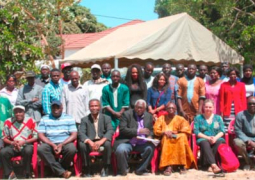People across the world are today, September 21st, observing the International Day of Peace (IDP) including civil society organisations in The Gambia.
The day was set aside by the United Nations in 1981 to be commemorated annually. The IDP is an annual day of non-violence, and for a cease-fire.
Many countries and people do honour a cessation of hostilities during the day, and do commemorate the day through education and public awareness activities on issues related to peace.
The day is a reminder to all of us of the need to maintain world peace, and to remember the plight of all those people in conflict zones.
This year, areas such as
The International Day of Peace also known as Peace Day provides an opportunity for individuals, organizations and nations to take practical steps to ensure peace.
On this day, we pray that peace may prevail throughout the world, particularly in conflict zones where innocent civilians are dying in mass.
Peace we believe is everybody’s business, and that there cannot be any sustainable development without peace.
Therefore, we use this opportunity to appeal, in the name of peace, to all countries and regions affected by conflict to resolve their problems through dialogue.
We further call on them to go back to the negotiating table, in keeping with the saying that jaw, jaw is better that war, war!
The theme chosen for this year is centered on young people: “Peace and Democracy”. It is fitting, since the two are closely linked.
In the absence of democracy, there cannot be any lasting peace. The observance of the rule of law is a guarantor for sustainable peace.
The theme is a challenge for emerging democracies to work hard in strengthening their weak democracies for peace to prevail.
Peace, we know, is not only about the absence of war, but rather is also about a society or a relationship that is operating harmoniously, and without violent conflict.
Peace is commonly understood as the absence of hostility or the existence of healthy or newly healed interpersonal or international relationships, safety in matters of social or economic welfare, the acknowledgment of equality and fairness in political relationships.
Since there could be no meaningful and sustainable development without peace, we urge all and sundry to maintain the peace.
“A smile is the beginning of peace.”
Mother Teresa


